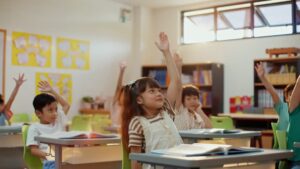Hey there, reader. Let me start with a little story from my own life. Back in my late twenties, I was juggling a demanding job in marketing, a young family, and what felt like a never-ending cycle of stress. I remember one evening, sitting at the kitchen table, staring at a pile of unread emails while my kid tugged at my sleeve for storytime. That’s when I decided to go back to school—not for a fancy degree, but for courses in mindfulness and personal development. It wasn’t easy, but education became my anchor. It taught me how to weave balance into my chaotic days, touching everything from my health to my relationships. If you’re feeling off-kilter in your own life, stick with me. We’ll explore how education isn’t just about facts and figures; it’s a powerful tool for harmony across all life’s facets.
Understanding Life’s Dimensions
Life isn’t a straight line—it’s more like a multifaceted gem, with each side reflecting a different part of who we are. When we talk about balance, we’re referring to nurturing these various dimensions so none overshadows the others. Education steps in here as a guide, helping us recognize and strengthen each one.
Think of it as a wheel: if one spoke is weak, the whole thing wobbles. Through learning, whether formal classes or self-study, we gain insights that keep that wheel rolling smoothly.
The Eight Key Dimensions of Wellness
Experts often break life down into eight interconnected areas, each vital for overall well-being. These aren’t rigid categories but fluid aspects that education can enhance. Drawing from wellness models I’ve studied, they provide a framework for self-assessment.
From my experience teaching workshops on personal growth, focusing on these has transformed how people approach their daily routines.
- Physical: Involves body health, exercise, and nutrition.
- Emotional: Deals with feelings, stress management, and resilience.
- Social: Covers relationships, community, and communication.
- Intellectual: Focuses on curiosity, learning, and problem-solving.
- Spiritual: Encompasses purpose, values, and inner peace.
- Occupational: Relates to work satisfaction and career growth.
- Financial: Involves money management and security.
- Environmental: Concerns our surroundings and sustainability.
What is Holistic Education?
Holistic education goes beyond rote learning; it’s about developing the whole person. Unlike traditional schooling that emphasizes exams and grades, this approach integrates mind, body, and spirit. It promotes balance by encouraging self-awareness and real-world skills.
I’ve seen it in action during my time volunteering at community centers, where programs blend academics with life lessons. It’s not fluffy—it’s practical, fostering lifelong equilibrium.
How Education Fosters Physical Balance
Education empowers us to make informed choices about our bodies, from understanding nutrition to building exercise habits. Courses on health sciences or even simple workshops on yoga can shift how we treat ourselves physically. It’s about prevention, not just reaction.
In my own journey, enrolling in a fitness education program helped me drop bad habits like skipping meals. Suddenly, I had energy for hikes with friends instead of crashing on the couch.
Practical Tools for Physical Wellness Through Learning
Many resources make this accessible. For instance, online platforms offer free modules on balanced diets. But remember, it’s the application that counts—education gives the knowledge, you provide the action.
I’ve laughed with students who discovered kale isn’t the enemy after a cooking class. It’s those aha moments that stick.
Education’s Role in Emotional Equilibrium
Emotions can be tricky, but education provides tools like journaling or therapy techniques to navigate them. Programs in psychology or emotional intelligence teach us to identify triggers and build coping strategies. This dimension often gets overlooked, yet it’s crucial for mental health.
A friend of mine, overwhelmed by anxiety, turned to adult education classes on mindfulness. It didn’t erase her worries, but it gave her balance, turning storms into manageable rains.
Pros and Cons of Emotional Learning Programs
Weighing options helps decide what’s right. Pros include deeper self-understanding and better relationships. Cons might be the time investment or facing uncomfortable truths.
Still, the payoff is huge—I’ve witnessed folks emerge more resilient, like shedding an old skin.
Pros:
- Builds resilience against stress.
- Improves empathy in interactions.
- Leads to healthier habits long-term.
Cons:
- Can stir up past traumas initially.
- Requires consistent practice to see results.
- Not all programs are equally effective.
Nurturing Social Connections Via Education
Social balance thrives on meaningful bonds, and education facilitates this through group activities or communication courses. It teaches active listening and conflict resolution, turning acquaintances into allies. In a digital age, learning to connect offline is golden.
I recall joining a book club through a local library program—it wasn’t just reading; it rebuilt my social circle after a move. Education bridged the gap.
Where to Find Social-Focused Educational Opportunities
Look no further than community colleges or apps like Meetup for workshops. Online forums on sites like Reddit’s r/socialskills offer free tips too.
Navigating these can feel awkward at first, but the rewards? Priceless friendships that add joy to life.
Intellectual Growth for Lifelong Balance
The intellectual dimension keeps our minds sharp, and education is its fuel. Whether pursuing degrees or hobbies like coding, it sparks curiosity and adaptability. This prevents stagnation, keeping us engaged with the world.
During a career slump, I dove into philosophy classes online. It wasn’t about the certificate; it reframed my thinking, balancing routine with wonder.
Comparison: Traditional vs. Holistic Intellectual Education
Traditional methods focus on memorization, while holistic ones emphasize critical thinking. Here’s a quick table to compare.
| Aspect | Traditional Education | Holistic Education |
|---|---|---|
| Focus | Facts and tests | Application and creativity |
| Methods | Lectures and exams | Discussions and projects |
| Outcomes | Specialized knowledge | Broad, adaptable skills |
| Suitability | Structured learners | Those seeking balance |
This shift can make learning fun, not a chore.
Spiritual Harmony Through Educational Exploration
Spirituality isn’t always religious—it’s about finding meaning. Education in philosophy, meditation, or ethics helps align values with actions. It fosters inner peace amid chaos.
One emotional story: A colleague, lost after a loss, found solace in spiritual studies. It balanced her grief with purpose.
Best Tools for Spiritual Development
Top picks include books like “The Power of Now” by Eckhart Tolle or apps like Insight Timer for guided sessions. For structured learning, try Coursera’s courses on mindfulness.
These aren’t quick fixes, but they build a foundation for serenity.
Occupational Balance: Education as Career Compass
Work shouldn’t consume us; education helps by offering skills for fulfillment. Vocational training or leadership courses ensure we’re in roles that match our passions.
I switched careers after a business ethics class—it balanced my paycheck with purpose, no regrets.
Navigational Guide: Where to Get Occupational Education
Universities like Harvard Extension School offer online certificates. Check LinkedIn Learning for bite-sized modules.
It’s about direction, not just degrees—find what lights you up.
Financial Stability Empowered by Education
Money matters for balance, and financial literacy education demystifies budgeting, investing, and debt. Classes on personal finance turn overwhelm into control.
Humorously, I once thought “budget” was a dirty word until a workshop showed me otherwise. Now, it’s my safety net.
Transactional Tips: Best Tools for Financial Education
Apps like Mint for tracking, or books such as “Rich Dad Poor Dad.” Khan Academy has free courses too.
Start small; knowledge compounds like interest.
Environmental Awareness and Educational Stewardship
Our planet’s health affects ours, so education on sustainability promotes balance. Courses in ecology teach eco-friendly habits, from recycling to advocacy.
Volunteering in environmental ed programs opened my eyes—it’s fulfilling to contribute.
People Also Ask
Drawing from common Google queries on education and life balance, here are some real questions folks search for, with concise answers.
How do you balance school and life?
Prioritize tasks with a planner, set boundaries, and include downtime. From my chats with students, mixing study with hobbies works wonders.
What is work-life balance in education?
It’s managing professional duties with personal well-being. Educators use tools like time-blocking to avoid burnout.
Why is school-life balance important?
It prevents stress overload, boosts performance, and supports mental health. Without it, everything suffers.
How does education promote holistic development?
By addressing all dimensions, from physical to spiritual, creating well-rounded individuals.
Can education help with financial balance?
Absolutely—literacy programs teach smart money moves, leading to security.
FAQ
What are the main dimensions of life balance?
The eight key ones include physical, emotional, social, intellectual, spiritual, occupational, financial, and environmental. Education touches each, promoting harmony.
How can I start using education for better life balance?
Begin with free online resources like TED Talks or local workshops. Assess your weak areas and target learning there—it’s transformative.
Is holistic education better than traditional?
It depends on your needs. Holistic offers broader skills for balance, while traditional excels in specialization. Blend both for best results.
Where can I find affordable educational tools for balance?
Platforms like Coursera or edX offer low-cost courses. Libraries provide free access to books and programs.
Does education really reduce stress in life?
Yes, by equipping you with coping tools and perspectives. Personal stories abound of folks finding calm through learning.
In wrapping up, education isn’t a one-time event; it’s a lifelong companion for balance. From my experiences and those I’ve shared, it turns chaos into clarity. Dive in, experiment, and watch your life align. For more on holistic approaches, check our [internal link to /holistic-education-tips]. Externally, explore the Brookings report on transforming education (https://www.brookings.edu/articles/transforming-education-for-holistic-student-development/). Keep learning—it’s the ultimate balancer.




